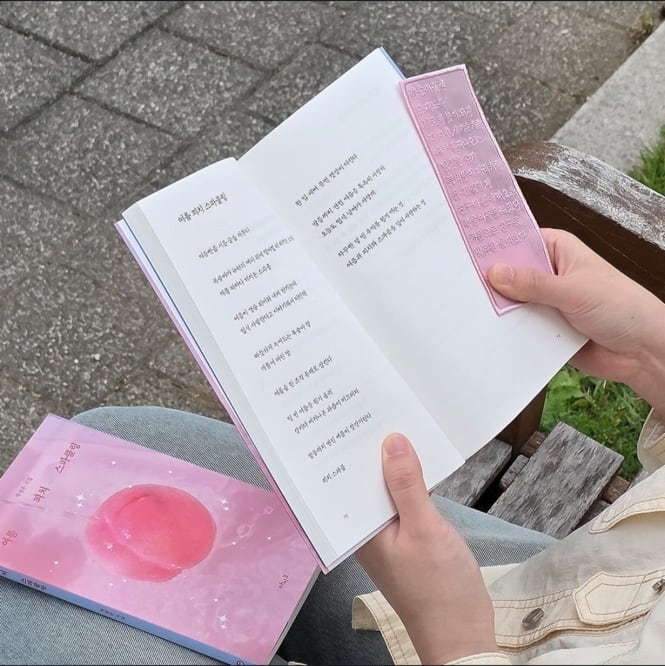Judul : She outsold Han Kang—with a cup of ramen
link : She outsold Han Kang—with a cup of ramen
She outsold Han Kang—with a cup of ramen
The bestselling poet in South Korea this summer isn’t a literary heavyweight or an award-winning author. It’s 19-year-old university student Cha Jeong-eun. Her poetry collections have soared past celebrated names like Han Kang and veteran poet Na Tae-joo, holding the No. 1 spot in Kyobo Book Centre’s poetry rankings for six consecutive weeks.
Cha first climbed the charts in early June with her collection Summer Peach Sparkling, which remained at No. 1 for five weeks. Now, fueled by a quirky online craze dubbed the “Tomato Craze,” her earlier collection Tomato Cup Ramen has claimed the top position.
Her rise reflects a broader shift in Korea’s poetry market, where a youth-driven cultural wave known as “Text Is Hip” is bringing poetry back into fashion. More readers in their teens and twenties are buying poetry books—not just to read them, but to post aesthetic shots of their covers or quote favorite lines on X (formerly Twitter). And increasingly, the poets behind those books are from the same generation.
Cha’s Summer Peach Sparkling has gone into its 13th printing in just over a month—a rare feat in the poetry world—and has sold roughly 15,000 copies. Her Tomato Cup Ramen, written when she was a high school junior, has sold more than 50,000.
According to Heo Joo-hyun, a director at publisher Dive, young readers are engaging with poetry in highly visual and social ways. “They post lines and covers on X or set them as phone wallpapers,” Heo said. “Some posts have racked up over 400,000 views—it’s become a kind of organic hype machine.”

One Instagram account, Poem Magazine, exemplifies the shift. Run by a twenty-something poetry enthusiast, it has amassed more than 80,000 followers by recommending books with punchy, irreverent captions like: “In an alien invasion, those who don’t read poetry get eaten first.” Last year, publisher Munhakdongne teamed up with the account to release merchandise at the Seoul International Book Fair.
Amid a wider downturn in South Korea’s publishing industry, poetry is thriving. Kyobo Book Centre reported that poetry book sales rose 9.9% in 2024 compared with the previous year. By May of this year, sales were up another 27% year over year.
And the surge is being led by the young. In 2024, 36.3% of Kyobo’s poetry buyers were in their teens or twenties—the highest proportion in five years. Bookseller Yes24 reported a similar trend: the share of poetry buyers in that age group has nearly doubled, from 11.7% in 2020 to 19.2% this year.
“In the past, poetry bestsellers were dominated by established voices,” a Yes24 spokesperson said. “Now, young and previously unknown poets are leading the charts.”
Indeed, among Kyobo’s top-selling poetry books in the second week of July, only one—by 27-year-old Yoo Seon-hye, a winner of the 2022 Hyundae Munhak Award—was by a formally debuted poet. The rest were penned by authors in their late teens or early twenties, most of them first-time, self-published, or independently discovered writers. Familiar names like Na Tae-joo and Han Kang now sit at fifth and seventh, respectively.
Cha Jeong-eun, who appears three times in the current top 10, is a freshman studying visual design. She began writing poetry in elementary school. “I read a lot of poetry growing up,” she said in an email interview with The Chosun Ilbo. “The more I transcribed verses I loved, the more I wanted to write my own.”
Publishers see this moment as a reflection of how swiftly Gen Z is reshaping literary culture. “Poetry is now the genre that best embodies the ‘Text Is Hip’ movement,” said one editor at Dive. “Teens and twenty-somethings are drawn to short, sensory-rich lines filled with emotions they relate to—and they’re eager to share those lines across their social feeds.”
When asked why her work resonates so strongly with young readers, Cha offered a poetic answer of her own:“I tried to capture the charm of things that shine—like the eyes of people just beginning to dream. Maybe, in my dreams, they caught a glimpse of their own.”
Demikianlah Artikel She outsold Han Kang—with a cup of ramen
Anda sekarang membaca artikel She outsold Han Kang—with a cup of ramen dengan alamat link https://www.punyakamu.com/2025/07/she-outsold-han-kangwith-cup-of-ramen.html
0 Response to "She outsold Han Kang—with a cup of ramen"
Post a Comment